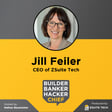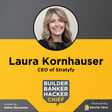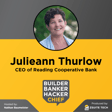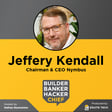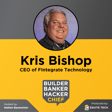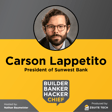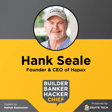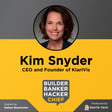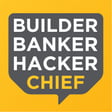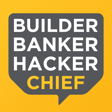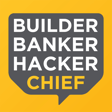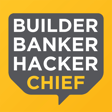Career Transition to Community Banking
00:00:00
Speaker
And in my heart, I wanted to to really kind of finish out the last part of my career into something, back into through what I call true community banking. But I also wasn't sure, it at that point, I'd been what I'll call Robin twice now as chief operating officer. And I wasn't sure about Batman. yeah Because when you're Batman, I mean, you're Batman, right? You got to deliver. You can't like not let the world be safe.
Introduction to Podcast and Guest
00:00:31
Speaker
Hi, my name is Nathan Baumeister, and you're listening to Builder, Banker, Hacker, Chief. A podcast where executives from the world of finance and technology share the story of how they got where they are and the decisions that made them who they are. I'm looking for hidden moments of truth and sacrifice, wisdom and folly. and what it's like to navigate the treacherous waters at the helm of a growing company. I want to do all that so that together we can learn from their journey and use that insight personally and professionally.
Alice Frazier's Background and Influences
00:01:03
Speaker
In episode 13, my guest is Alice Frazier, president and CEO of the Bank of Charlestown. She also serves on the board of directors of the Federal Reserve Bank of Richmond and is the vice chair of the Independent Bankers of America, or ICBA.
00:01:18
Speaker
When we talk about breaking glass ceilings, it's important to remember that our society has come a long way in a fairly short time. Today, it makes perfect sense that Alice Frazier would be leading a community bank, serving on the board of a Federal Reserve Bank, and helping guide one of the biggest national associations for bankers. She has all the skills those roles require, and then some. But that seemingly obvious fact wasn't so obvious for her mother's generation. Alice's mother paved the way for her daughter, eventually becoming a chief of police in a small Virginia community when that kind of work was seen as a man's job.
Impact of Family and Early Career
00:01:56
Speaker
Her parents were the type of people who led by example more than words, showing their daughters how to build communities, run businesses, and overcome limitations. And when Alice took her first job in a bank as a loan review officer, she had to put all those skills to work, disrupting the status quo and bringing much needed accountability. A bit like a certain Caped Crusader who she mentioned in the episode. She spent much of her career supporting other CEOs, growing her abilities, and developing a vision for how she would lead her own team one day. I doubt that many of Alice's friends or family would have predicted that a young equestrian major would pivot to becoming a banker, or much less a CEO. But it's so clear that even though she's no longer in a saddle, Alice has jumped over every obstacle in her way, never breaking stride or faltering in her values.
00:02:49
Speaker
The best part is that we get to share Alice's story with you, our listeners, on episode 13 of Builder Banker Hacker Chief.
00:03:03
Speaker
Well, Alice, I can't tell you how grateful I am to have you joining us today for Builder Banker Hacker Chief. Thanks for being with us. Oh, thank you, Nathan, for having me. I'm excited to be here. Absolutely. It's been a pleasure getting to know you a little bit, um as well as your bank through the past years, as our company has had ah quite a few interactions ah through the ICBA's accelerator program, which I know you're a big part of, um and just ah can't wait to be able to learn from you and hear the stories of what helped you to become just the fabulous leader that you are. Well, thank you. I hope that i hope it is inspiring to someone through this process. Thank you.
00:03:43
Speaker
Oh, well, I definitely know it will be.
Leadership Lessons from Parents
00:03:46
Speaker
as As you think about who you are as an adult, I think all of us kind of had natural tendencies and certain impactful lessons as we were growing up. And i'm sure that is as you grew up that you had those as well so i was wondering if you could just as you think back through your kind of growing up years. What were some formative experiences that you had or formative formative mentors that helped you now that is you look back really help to shape you and the thought process of how you lead people and lead organizations.
00:04:21
Speaker
No, I often get asked this question, and I've thought about it a lot. And it it didn't it wasn't something so obvious when I was growing up. and and so But at the end of the day, it I do have to go back and I look at both my parents, and then in particular, my mom. They were not parents that necessarily would give you pearls of wisdom by speaking, but they gave a lot of pearls of wisdom by action. And sometimes that action is something that you have to think about and notice later. And it's ah one of the couple of those things that I would say that really stand out as I look at who I am today and why I am that person is just their instinctive ability to just get in to a community and really work to build it. And when I say that, when I was about 13 years old, we moved
00:05:17
Speaker
from a big city of Norfolk, Virginia to a smaller city outside of Charlottesville, Virginia. And in that area, there was um no place to go buy groceries. So you were driving 45 minutes to get groceries or to get anything. and And that was quite a change when the grocery store was just you know maybe a tenth of a mile away. And so my parents engaged with some folks and and built a center that had a grocery store and other things that local people would want, but that wasn't enough. Then they began to build like a mini chamber of commerce in the area and they gathered people and and really tried to build community deeper into that. And so when I think about being a community banker and when I first became a community banker and saw what that meant, it's all fits into what I saw them do and how they built community around where they were. But then I also look at my mom and
00:06:16
Speaker
have to say how amazing she was. I didn't realize it at the time because you know when you're growing up, you're not appreciating what your parents are doing as much as you should. Well, parents aren't people, right? like Parents aren't people to to the kids. They're just, you're the one that gives me food and takes care of everything. Oh wait, that's how you're an adult. You're like, oh, you're an actual person and you're super interesting. I know, I know. And I didn't appreciate it because I didn't appreciate it even further. So one of the things that she did, she always worked and she was always an entrepreneur. She, through growing up, she I can remember she had a pet shop with exotic pets.
00:06:56
Speaker
And then she had a craft store where she taught people how to um you know do various crafts and back in that candle dipping stages. And then when we moved up to outside of Charlottesville, um she didn't dive into entrepreneurship right away, but ultimately
Leading by Example in Community
00:07:11
Speaker
she did. But before she did, she took a job with a police department, the local police department. So when you're a ah high school middle school and high school, You don't really want your parent to be involved with the police, right? It's not not the area, of the thing, but she didn't just settle with being a police officer. She went further and continued her career through that to become the chief of police, but also the first woman to graduate from the Virginia Forensic Science Academy, which was a big deal. And I didn't realize that at the time, what a big deal it was.
00:07:49
Speaker
Until a couple years ago, a couple years ago rather we were cleaning out some of the things in her um apartment and I found an article and I was reading it and I said, well, mom, this article says that the men really treated you well. And and I said, is that true? Because this was back in 1980-81 and she was the first one and she said, no, not at all, but I wasn't going to let him know that either. so ah so yeah She kind of broke a lot of ground along the way. Wow. Well, that's awesome. Yes. i love i love I love both of those stories.
00:08:31
Speaker
um because I think as a leader, lots of times you think that you have to teach people with your words, right? You need, well, if I can only get them to understand this or, oh, I saw them do this thing, so let me sit down and talk with them about what they could have done differently. And not to say that there's not a time and place for that, but how much more powerful is it to teach leadership by your actions? I mean, what a beautiful story about your both your parents moving into a com community and saying, hey, this could be better. And instead of complaining about it or moving away or anything like that, like, no, I'm going to let's build a grocery store. Let's build a town center. ah Let me go join the police force. Hey, I think I can lead this.
Lessons from Equestrian Involvement
00:09:19
Speaker
Why not? I'll be the first one. It doesn't matter. I'm going to do it. I just love that. um ah Yeah, I just i I love that lesson and that example that your parents were able to give you for that.
00:09:30
Speaker
Oh, they did. They, well, they gave us plenty um because even as we, so we were in a rural area from that point of it and my sisters and I got involved with horses and we started riding. Well, then I think um we started also showing horses and if anybody's done that before, it can get quite expensive and you have three girls and four horses and horse shows. And they actually, so we had our unborn, we had to take care of the horses. So they taught us a lot ah about responsibility and being responsible for something other than o ourselves. But to go to shows, we had to earn enough money in the winnings, the prize monies, to be able to pay for the next show. So they taught us business very early in that. And they didn't just like take us out and say, go have fun at the shows.
00:10:19
Speaker
um which we did, but they also made us be mindful of what that cost was in doing it, which I think kind of gave us gave me that first taste of what business was like and how it would be. Yeah, no, absolutely. I think that that I know I could I could speak for myself, but as well as many others that um transactions are typically thought of as consumption. Right. Like everything's about consumption. But when you're running a business, if that's how you think, then you're just going to go out of business. Those important lessons that consumption can only be held at a certain level based off of what you can earn.
00:10:57
Speaker
and the difference between spending and investing and stuff like that. What a cool way to teach you that with picking a hobby that you all had passion for and interest in hint and using that to be able to teach you life lessons. I think there's a nugget in that as well of leaning into people's passions in a way to be able to teach them how to become more and better and not trying to teach them in stale or ways that they might not connect
Transition to Banking Career
00:11:25
Speaker
with as well. Right. Right. Well, it was a fun way to teach budgeting. I'm not sure my dad came out ahead on that. I'm just going to tell you, I'm pretty sure there was a big hole in what we want and what, and way but he came, but I'm sure he feels like he came out ahead on the investment that he made in you.
00:11:44
Speaker
us you didn't say otherwise When I went to college, I was actually an equestrian major and I came out an a accounting major.
00:11:56
Speaker
I'm pretty sure my parents were freaking out as they were packing me up for school thinking, okay, I'm going to spend money on all this college and she's going to muck stalls the rest of her life. Yeah. Well, I'd love to hear the story about that transition. So you went in thinking that you were going to work with horses for the rest of your life and then ended up working with debits and credits for the rest of your life. That seems like a pretty big change. Um, uh, what was, yeah, what was the story? What was the journey there? So wait it was one semester in, and and um so you know one to we as sisters had never actually gotten really hurt when we had ridden, even though it had been about five or six years. And and unfortunately, one of my sisters had a bad fall. And as I was at school thinking about it, I was like, what am I doing here? And there was the good fortune of the dean of the program actually said, you know, you can't just be an equestrian major. You need to have some business classes behind you as well.
00:12:55
Speaker
And so I had signed up for accounting in that second
Introducing Accountability in Banking
00:12:58
Speaker
semester. And in that, it weirdly made sense to me. And I i totally understood what was happening. And at the same time, my passion for really writing and in doing it was waning as that was growing. And so it was a good, good transition over. Yeah. ah A little bit of ah mentorship, direction, ah a little bit of being willing to try and experiment other things and find other interests that you might have. yeah I love that. um This idea of experimentation and ah trying different things through exposure, I think could help a lot of people open up their mind and eyes to all the different opportunities that exist.
00:13:43
Speaker
Isn't it? ah ah i'm I'm sure you've had this experience too, Alice, but isn't it amazing how many people are out there in the world that are willing, ready, and able to help others? And literally all you have to do is ask. That's right. And in that and ah I think so many folks are afraid to ask. And in that I learned, you know what? What's the worst that can happen? They say no, or they don't come through. Yeah. Awesome. So you got ah your accounting degree. ah You had a professor that helped you get that first job. Where'd you end up? I landed at what was then Ernst and Winnie. He opened the door by making a phone call to the management director. And then he said, it's in your hands from here. So I landed my first job at Ernst and Winnie. It's now Ernst and Young now and um was in their auditing department and spent a couple of years there
00:14:39
Speaker
before I moved um to a smaller regional firm after we got married, and because I had moved away from Richmond, Virginia to Winchester, Virginia. That firm was involved in banking, and so I audited banks, and that's where I had that opportunity to get to know what banking was about, particularly community banks. Yeah. but So obviously foreshadowing anyone that knows Alice's background, you know, she's president, CEO of Bank of Charlestown, BCT. So now you're looked at as a banker, right? But at that time you were an accountant. Right. So talk to me about a why why that transition or kind of what happened after working in these accounting firms and kind of getting your degree degree from accounting to moving over to banking. What was the interest? What was the driver?
00:15:33
Speaker
Well, when you're in public accounting and you're doing auditing, I always felt like it was sort of like hit and run. You come in and you do the audit and you leave and maybe you make some recommendations, but you don't get a sense of really doing something to grow a business. And at that point in time, um the SNL crisis was over and a community bank that um was over and the and the regulators were actually being pretty tough on community banks. And one of the community banks I had audited had approached me and said, YOCC is requiring us to get a loan review officer. Would you be interested in the role? And a friend of mine had left the firm about four or five months earlier to do the similar role at another community bank. And I had been talking to her, and it sounded like she was really enjoying it. And so I did explore it. i enjoy it And I joined that bank, which was Middleburg Bank, in 1991 to start their loan review department. It was a single branch bank.
00:16:35
Speaker
had 32 employees. I was number 33. It was 110 million in assets. And I was the first officer hired in. And back in those days, that was like, what is happening here? You had to have worked into the company to ever achieve an officer role. So broke a little glass, didn't know that that I was doing that at that point in time, um but learned that learned that after I got in. Yeah. Did you run into some challenges, ah kind of getting into the organization in that way that you kind of had to had to break through? Any lessons learned in that in that regard as you were breaking new ground? Obviously, sometimes that ruffles some feathers and that makes it a little bit difficult.
00:17:25
Speaker
I definitely was rank and grow in a couple of ways. One was a loan review officer. So I was reviewing loans that senior executive officers were making. So these, i here I was, what, all of 27 years old. And these gentlemen had been making loans for 40 plus years and had a good history. And I was their loan review officer. So you can imagine there were a few conversations from time to time that had, had some, um, interesting comments about them. And so that I that turned the corner when I was reviewing one particular loan, and it was for a construction company. And you could see sales declining, you could see cash going out. But even though they had, you know, a low six figure amount, it only looked like it could carry them for about six more months. And I remember the first conversation with the senior executive on that, that bar or the relationship manager for that bar or
00:18:23
Speaker
And he's like, there's no way this is going to go bad. Absolutely not. It went bad. You're like, I have a different point of view. but Six months later, it went bad. It wasn't something that I would have ever wanted to have happen for the for the company or anything like that. But it did help a little bit in bringing some credibility to the loan review function. I'm not going to take it for myself, but to the function of what loan review does for it.
Importance of Relationship-Building
00:18:54
Speaker
Alice's mother set a shining example for her daughter to follow. Talk about breaking glass ceilings and ruffling feathers. She comes into the bank, hired as an officer for a function that didn't exist previously, and starts bringing much needed accountability to the lending operation. It's hard to imagine running a lending department without the rigors of modern underwriting, but clearly that was the status quo for a long time. What Alice did for the bank was hugely disruptive, but in a subtle tectonic way. Today we talk about disruption and the conversation often hinges on flashy technology and marketing. Sometimes the disruption you need in your life or organization is simple accountability and a higher standard of excellence.
00:19:43
Speaker
But being in that first officer coming in from the outside, it did, I needed to, once I learned that, I really needed to step in and be willing to do and learn about the whole company and not just look at my own role, but to step in and help where I could so I could build the relationships I needed to be to be helpful overall. Yeah, I've always seen that, ah you know, if you look on just paper, building relationships, friendships, even with coworkers is something that's not needed. ah If you're just looked at it like very black and white.
00:20:22
Speaker
um But I've always seen relationships or the grease that helps businesses run both internally and externally. So what a wonderful lesson that you got early on in your career ah at that bank that, no, you you really need to understand the business holistically and you get you need to get to know the people. You need to build
Progression at Middleburg Bank
00:20:42
Speaker
relationships. Otherwise, you're not going to have success here. That is true. That is true. They are critically important and I always encourage it. I'm always like, go to like go to lunch with your colleagues and don't talk about business. Just get to know each other because then the next time you're sitting around the table, you might actually have a different perspective when they say something that you may not necessarily agree with, but you might be able to understand why they would be saying what they're saying. How long again were you at Middleburg Bank?
00:21:14
Speaker
I was there 16 years. Good run. You started this loan review ah department or processes. Did you have the chance to be able to kind of do various different things as you were at the bank? I did. you know About two years into that, I actually went to the senior executive I mentioned earlier and I i told him, I said, you know this is nice and this is good that we're doing it. I said, I just don't know if this is going to be good for me in the long term. And he said, hold on, Alice. Our current CEO is retiring, and we're bringing in a new CEO. I really want you to stick around for this, because I think he's going to really put us on a growth pattern. And I'm really great glad he gave me that advice, because that CEO, um before he joined, he asked all of us, the officers, to write a letter. Tell us what tell me what you think needs to occur in the bank.
00:22:11
Speaker
And I boldly said, we need a CFO. There'd never been a CFO. And I boldly suggested that from a perspective of how do we look at finances different? How do we look at growth different? How do we look at how we, um, operations differently? And he took me up on that bold step and offered me the position of CEO or CFO rather, um, after he joined. And so started from there, CFO. And then ultimately, when I left, it was chief operating officer. Wow. Yeah. Where did you where did you find the courage to make that bold statement to someone who you know it might be your boss ah fairly soon, um knowing that it's something that never happened before? And I just asked because I find so many people.
00:23:03
Speaker
are worried about making suggestions like that or being bold in their suggestions. So where where where do you think that came from? You know, Nathan, I think I was too green at that point to know better, um but also felt confident that this was an opportunity for the bank to grow and do something different as well as for myself. Yeah. Well, if that's being green, I hope that more people keep that mentality throughout their entire careers, because I think the learned behavior of withholding suggestions is actually bad. I think that it's bad for companies. It's bad for individuals. It's bad for, you know, just to broaden that out to the communities that we're involved with, um even our nation. So being willing to engage and share opinions, I think, is someone something that all of us should do. I agree. I agree.
00:23:55
Speaker
and I actually encourage that quite frequently on my current team and and all those around me. Yeah, I love it. so i Barely got into banking and now you're already a CFO. Two years into it. i mean Wow, that's what what what a great but a great story. now um as you As you went through that transition from CFO and then later on to COO at that bank, any other ah you know golden nuggets that you look back at just from an experience perspective or from a learning perspective that that you look back fondly now? There are a couple of things actually. The first off is that is really where I fell in love with community banking because that single branch bank in this small town that it was,
00:24:46
Speaker
the lobby was the community place. And so folks would go to the post office next door and then they would come over to the bank. And sometimes they'd have a transaction, but most of the time they did not. They just came to see who was there and to talk with folks. But then at the same time, um the CEO really encouraged me to get involved in different community activities. And then so that helped me also begin to see how much a community bank plays in the economic growth and the viability of communities. And to be able to either drive around or walk around and say, you know, we help that business or we help, you know, this nonprofit grow or this person buy their house. thats That's where I really fell in love with the true boots on the ground spirit of community banking. So that was kind of the first biggest nugget um that came to me. But all the way through that 16 year period,
00:25:47
Speaker
yeah I had so much latitude to do and try a lot of things from that CEO. And I can't tell you how much I appreciate that opportunity he gave me. We um we opened up offices. We bought a part of a mortgage company, had an opportunity to integrate that. And so I had to learn again what it's like to really take something you're buying and and getting it into a different culture. We did a trust company. um started so many different business lines for that bank.
Learning from Middleburg CEO
00:26:20
Speaker
And the nuggets I get from that was, you know if you're willing to take the initiative and really step forward and make your leader's job easier, that lane of latitude gets a lot wider. And and i and I really said, okay, I'm going through it until i until I'm told to stop at that point.
00:26:46
Speaker
Yeah. Yeah, I love that. If you could reflect a little bit um on your the CEO that kind of gave you this empowerment, this latitude to to be able to try things and experiment and stuff like that, as you look at the the model that the CEO presented, um what are some of the things that you've taken away and now are reflecting in your own leadership style? Collaboration. He really, that's the first and foremost thing. He really has brought us and his executive team around to really collaborating. And he did not, he was not a top down, this is what we're going to do leader. He really said, what do you think we need to do? And how do we collaborate and make this better? um and And that was um really how I like to work today.
00:27:42
Speaker
With the teams, I really enjoy being to brainstorming and setting forth. Do I have a vision? Yes. Can I and share that? But I love it when we can work together to make it even better than it than anything that any one of us could do alone. All good things come to an end though, right? So 16 years there, you're still not at that particular bank. So tell me a little bit about the transition. So what happened next? Thank you. We went to through a succession plan. And I wasn't chosen to be the next successor on a CEO, which quite honestly broke my heart a bit um because I had given so so much to that organization.
Experience at BB&T
00:28:24
Speaker
But in looking back now, it was the best thing that happened to me. um I was also working with an executive coach at time and said, you know, I want to continue in my leadership. I think I want to be a CEO one day.
00:28:38
Speaker
And so, but I'm not sure. And he said, well, let's look at your resume and see what you're missing. And I was clearly missing. I had done everything in the bank. I was clearly missing commercial banking and actually sales leadership. And so fortunately for me, I, um, an opening came with BB and T bank. It was that at that point in time as an area exec and the accounting I already lived in and was able to, um land that opportunity and step into it. But I have to tell you, the day I and left the one job and then the next morning I woke up and I was in a near panic attack because I had never sold anything in my life. You got to remember I was all on the ops and the finance side, right? I'm thinking I am going to a bank with a fantastic sales culture.
00:29:30
Speaker
I have never sold anything in my life. What am I going to do? And so sat down and and really had to think through that, worked a little bit with the executive coach and and put together a thought process and plan. But what I was really excited about and what I thought about in thinking about what would be the but next best bank is the bank I had been with had really grown a lot. And I said to the HR director, I said, you know, I feel like we're in middle school. We're too big to be really a small bank anymore. We're too small to be a big bank. So Alice spent 16 years helping build Middleburg Bank. She clearly understood the business, the culture, and the community. But Alice wasn't content to rest on that success. She had a hunger for something more, and she jumped boldly into another organization to get the skills and experience she wanted.
00:30:26
Speaker
That's the kind of drive that opens doors and allows leaders to achieve nonlinear growth. Her new role at BB&T wasn't about doing the same job for more money or working twice as hard. It was about developing competence in a new domain. Now, this isn't an argument for would-be leaders to master every aspect of a business before you decide to lead the growth of a company. What you do need is the willingness and boldness to take on new challenges. You don't have to be the best plumber or carpenter in the world to work professionally as an architect, but it does help to have a solid grasp of other disciplines so you can recruit those talents into your team.
00:31:12
Speaker
But how does how does a bank that's really grown and affect culture over a broad geographic market? And at that point in time, BB&T was fantastic at that. You know, they were in North Carolina and I'm talking about Northern Virginia, and they were very consistent in being able to affect that culture. So to to be able to go over to BB&T and get that commercial sales experience and also just absorb as much as I could about culture and how to define it and how to really
00:31:45
Speaker
um make it live and breathe across a large geography, across business lines, um was a huge opportunity for me. Yeah, yeah it's ah it's funny when you when you shared that you know you went to sleep one day, ah leaving your old job, next day you're waking up and you're doing a whole new challenge and you're feeling that level of anxiousness. It took me back to several times when I felt that same thing. white What was the driver that allowed you to kind of push yourself into that level of um, uncomfortableness, right? Like that's, that's a hard thing to do. Um, it's hard for people to try new things. It's hard to push into a level of doing something that creates greater anxiety. What was it that kind of drove you?
Mentorship and Career Growth
00:32:39
Speaker
I don't know that it was a new approach for me because over the past 16 years,
00:32:45
Speaker
with the bank before, everything we were doing was something new. Either we were going to, you know, I'd never converted a core system before in a bank, but we needed to get one. And so it was always there pushing to something new. This was just a bigger something new. And once I was able to really think about it and put a plan around it, I felt better and more confident about what was going on. And I still, I mean, it's still, very much the way I live on the back of um the note cards I use for internal notes to the team here at BCT states, whatever makes you most uncomfortable is your biggest opportunity for growth. So it's kind of a motto I live by. Yeah, no, I love that. I love that. I also I really appreciate
00:33:41
Speaker
how much and this this common thread is getting pulled throughout your whole life story about your willingness to engage with other people, to give you advice and feedback on what you can or need to do to better yourself, improve yourself, or to achieve that next milestone. um As you shared working with the executive coach, building, you know, oh hey, I wasn't picked, this hurts. I still think I want to do this. I'm not going to wallow in that feeling. Rather, I'm going to do something about it. Help me. Let's go figure something out. And then you take a take a plan to move forward. I just I just I love that and your willingness to get engage with those outside mentors. You've mentioned this a couple of times, so I just love to kind of take a sidebar here real quick.
00:34:30
Speaker
because it seems like you've done a good job at this.
Modernizing Cardinal Bank
00:34:32
Speaker
How do you find those mentors, those executive coaches, those people who are willing to engage with you that you can build that trust with, but they also are willing to be honest with you to kind of have those hard questions?
00:34:46
Speaker
I think you have to. um Well, for me, it's always being open and and really connecting with people. And I have to I have to connect with somebody. I have to feel like they get what I'm trying to achieve, or they can help me put into words things that I'm struggling to put into words, but these thoughts that I have in my mind. And and so that that oftentimes is looking for those executive coaches. But then sometimes I need the person to kind of give you that nudge up against the head that says, hey, pay attention here.
00:35:26
Speaker
Or to irritate you a little bit to push you for a further past what you're going to do. Yeah. A little bit of a rock in your shoe, just enough to make you uncomfortable. And be like, OK, yeah, I need to do something different. Got to move forward, Alice, and get uncomfortable again. Yeah. So you went to a much larger, a much larger bank, got some sales, uh, some sales training, some culture training and learning. And so what did, so what did you, what did you do with that? What was, what was next for you kind of on that, on your leadership journey? I really thought that I would be a there about four years. That was kind of my mental thought that I could really absorb a lot. And then about two years in, I received a phone call from a recruiter that was,
00:36:14
Speaker
recruiting for a chief operating officer for Cardinal Bank, um another regional bank in the area, um just within the Washington DC Metro area. And um I met with the CEO, we talked over a couple months period of time, and um was able to really come together on what he needed. And I remember him saying we we would meet in Panera and he goes, Alice, we operate like $100 million dollar bank. And they were 1.8 billion at that point in time, and a couple hundred employees. And he says, we operate like $100 million dollar bank. I was like, oh, come on, that can't be true. Well, finally when I joined, I'm a month in and I went to his office and I was like, it might be more like a $50 million dollars bank, but we will get there. so
00:37:06
Speaker
ah Because once again, I was faced with a bank that was on a core system where they were the last bank on the core system, and we needed to transfer into you know a new core. And there were a number of things that needed to be built and needed to be designed with that bank that you know you just push your sleeves up and you work hard to find the right team to help you get there. and um build it from there. So we we grew from 1.8 billion to 4 billion over an eight year period of time. Mortgage company grew from about a billion to 4 billion. And it that too was a great run because it was, um it was in what was different about this bank than the very first bank I worked for, the very first bank was 70 plus years old and a truly like really locally owned shareholder base.
00:37:59
Speaker
This one was at that point had only been formed in 1998 and I went there in 2009. So it was 11 years old. And so different kind of shareholder base, different kind of focus from mainly commercial. The other was largely retail. And um so it was fun to really help grow that bank as a team, but also really take it to be a high performing organization as well. Yeah, that's great. And did you find that as you were going through that those that growth that you were able to apply both things that you picked up at Middleburg as well as what you picked up with your two years at BB&T? Definitely. A number of things on that one, like the beep from the BB and&T, even the ah whole culture component and defining what the business model, what you know what is the business model of the bank to help bring together
00:39:00
Speaker
commercial and retail because they just operated completely separately and not together. So how did we really put the business model together, the sales model so that those conversations could be something more than I'm taking the deposit and I'm doing the loan. We became bankers together as a group. Um, that was really critically important. And then the culture, because that was spanned over 29 branches. and a whole Washington DC Metro area. So how do you really bring a culture together when you really aren't in the same building and defining that some more, which it was exciting. It was a lot of fun, lot of a lot of growth pains along the way, but a lot of fun at the same time. Yeah. Well, it is pretty interesting sometimes how um pain
00:39:56
Speaker
and maybe not fun in the specific word, but maybe fulfillment might be better. But it's just that sometimes the hard things are those things that you look back most fondly on. I agree. I agree. Because I think it's more challenging, the mental challenge of it. How am I going to move this from here to here? How do I get folks to follow along with these ideas when they're kind of comfortable doing it the way they were, but we need to move forward. And how are we going to move that forward so that we can continue to grow? Yeah, yeah the the the cultural question I think is pretty timely too, as you're talking about how do I
00:40:43
Speaker
Or how do we build this culture spanning across a large metro area, across multiple branches? I think a lot of us are struggling now with that question too, but even broader where you know you have so many remote workers, remote teams and such like that. And I know some banks as well as some companies are really focused on still coming to the office. Some are hybrid, some are all for fully remote. But I wonder if there are some tidbits that you learned both at BB and&T as as well as um growing Cardinal Bank um on kind of that culture building piece that could be applicable today with folks that are struggling to do that with the diverse workforces that we're dealing with now.
Vision and Core Values at BCT
00:41:29
Speaker
Everything you do regarding cultural culture has to be intentional. You have to you you have to stay focused on it. and And one of the things that um we've done is and is really um focus on our core values. I can give you a a number of different ideas on that. we started I started with writing down a vision, an executive coach that I worked with um I knew in my head, I had this idea of what it could look like. I had the support of the board mean from the very get-go and look in joining this organization is the intentional focus on our team, the employees, so that if we take good care of them, they take good care of the clients that ultimately results in not only shareholder value, but great community growth. But then what does that really mean? And so defining that and setting expectations to it
00:42:29
Speaker
um things defining what leadership means in the organization, and what do we expect the leaders to do um in their roles, and and how how do we expect the team, if if we want to be a high performing bank, we can't have a mediocre team. But what does that really mean to be performing at levels? And so we we spent a good bit of time um working through that, building out a vision book that we share with the team. we were And we engage in you different training with that, those concepts within that vision book relating them back to our core values. Annually, we have a Together on Purpose day. um And we bring everybody in because we have hybrid workers and we have full-time remote workers and we have in-office workers. But we bring everybody in. And during that day, when not only do we ask them, what can we do better?
00:43:29
Speaker
And we spend a number of different actions on it, but we relate it to the vision book. We do work before we come related to the vision book. But at the end of the day, we sign our commitment board to the core values. And if you were to come into our headquarter office and and when in my I have one in my office, our boardroom, they're in the foyer. You see the commitment board and everybody signs their signature to our core values, similar to signing a national letter of intent if you're a sports going on to be an athlete in the college, and the year you started working at the bank. And i I think that's a point where folks begin to take it and say, okay, this is serious. They really mean what they say. And so every month in our employee meetings, we go over the core values. We do things to outline how this relates back to who we are as a company.
00:44:23
Speaker
As a leader who comes into an organization, it can be easier to keep the wheels on the bus and make sure everything runs smoothly. It's a totally different undertaking to set a vision for the culture and implement it successfully, because everyone is going to have opinions. As a CEO, you have to learn how to receive all kinds of criticism and continue shaping the culture without getting discouraged. Alice was methodical about clarifying the company values and inviting people to participate in making things better. Culture doesn't fit neatly into the profit and loss statement for any business, but it's arguably one of the most valuable investments you can make for long term success.
00:45:11
Speaker
But it has to be really intentional, even when you bring new people in.
Embracing CEO Role and Learning
00:45:16
Speaker
the time we spend on um bringing that core values and who we are as a company and what we're aiming to be starts at the very beginning and continues through.
00:45:27
Speaker
I love that. So this is um all of that that you talked about. That's with BCT, right? That's right. which is Which is the organization that you joined right after Cardinal Bank. And if I understand correctly, i you were brought in to actually now get to that role that you aspire to or that you were working towards to be the CEO and president, right? That's right. How did that feel? um I have to ask because, you know, I had a long time dream of being a CEO of a growth company. And i know I had a lot of feelings to deal with what had actually happened. I was like, oh, well, ah now what am I supposed to do? I'm just curious kind of when you when you actually kind of achieved that that particular goal, like how how did how did that feel? ah How did you deal with that? And where where where where did you go from there? right So can I back up for a minute first? so Oh, absolutely. The reason why I was li um actually
00:46:27
Speaker
open for that opportunity was Cardinal Bank had sold and I was the chief operating officer. And as you know, in those situations, chief operating officers aren't necessarily needed in that acquisition. And I was actually really quite fine with that because that was sold to a much larger regional bank. And in my heart, I wanted to to really kind of finish out the last part of my career into something much into back into true what I call true community banking. But I also wasn't sure it at that point I'd been what I'll call Robin twice now as chief operating officer. And I wasn't sure about Batman yeah because when you're Batman, I mean you're Batman, right? You got to deliver. You can't like not let the world be saved. Gotham cares a lot. Gotham wants Batman to win.
00:47:20
Speaker
There you go. There you go. um So anyway, my husband said, you know, Alice, if you get a chance to be Batman, you got to go. And but we did explore a lot of options um and was really open to it. But this one felt the best. The board um I interviewed with the board, they we were very aligned on and on a lot of things and the opportunity of the type of the bank was was the right. So picking that was good, but I will tell you that first six months, it was like, okay, this is on you. You're not, you know, there's no, there's no CEO. This is, this is your role. Where are you going with this? And um so it was a little intimidating at first. And again, as I've noted, reached out and connected with someone who was a former CEO of a bank.
00:48:13
Speaker
that was working with banks on strategic plans, et cetera, and spent some time talking to him about, you know, that role of CEO, what was his experience, and learning from him in a different way. I had learned so much from each of the CEOs I reported to, the Middleberg Bank one, um about the whole collaboration and and really engaging people. Even at BB&T, the regional president was really about helping people like speaking and telling stories to engage the team in different ways. And then the last CEO taught me a ton about business and um really ah best prepared me for the CEO role. But I'll be honest with you that that part of being uncomfortable to get to for growth, I wasn't as confident as I probably would have been or should have been in that first six months. What flip the switch?
00:49:13
Speaker
I don't know that it's totally been flipped yet. You know, I think we're still all growing and and working together. And I think it's, it you gain confidence along the way, but there's always points in times where you're kind of scratching your head going, are we doing the right thing? And am I, you question yourself in this role and you know, there's bumps in the road and and you have to recover from them. So. Yeah. One of the things that I found fascinating in um talking with so many wonderful leaders and executives, um I had no clue how prevalent imposter syndrome was.
00:49:51
Speaker
across the board, um you know, some of the most competent, ah most experienced um results driven, like you look at the results that they've driven, it's just like, this is crazy. And you're like, and you start asking questions like, I actually don't know what I'm doing. And it's like, what? Like, I don't know if I deserve to be here. And I'm like, are you kidding me? But then I think about myself and I think the same thing about myself. So it's it's interesting how prevalent that is.
Building Trust and Team Collaboration
00:50:23
Speaker
Yeah. Well, I loved I loved what you shared on. how setting a vision, setting core values, making them, everyone live out loud, understand them, talking about them, having them sign things about like their commitment to them. I just love that whole story of what you've done with BCT. And I can only imagine that you've seen great great returns from all that work that you've done. um as you As you are still continue to be in the leadership position in BCT,
00:50:56
Speaker
Any other experiences that you just look back at that, uh, that, that you've had there that have helped you to continue on your role as growing as a leader? You know what I really appreciate is getting to a level of candor within a company or within a team where your team can kind of call you out and say, Hey, Alice, you know, you kind of flubbed up the other day when you're in front of a group of people and you, You may not realize you said this, but you did. and and that And when you have that level of candor or even that relationship that's built with the team where they help you when you stumble at times, and gives which gives then me the opportunity to go back to either person and go, I totally didn't mean it that way. Or, you know, I'm sorry that came out that way. Whatever it is I need to do, I think
00:51:53
Speaker
That to me is critically important. And in getting to the level of that sort of relationship has been something I've really learned to develop. And I really encourage our entire team to do that too. I encourage them, you know, don't go go out to lunch with each other. Spend time with each other outside.
00:52:16
Speaker
Receiving candid feedback with grace and humility is so difficult. Integrating that feedback and making change is even more so. Alice's point here is that if you want a high level of collaboration with your team, you need a high level of trust. The foundation of that trust comes from the time you spend connecting outside of work. Casual lunches and conversations about life may not feel like they're moving the business forward, but there's no substitute for the empathy you can build in these moments. That's where true vulnerability happens. And as Brene Brown says, vulnerability is the birthplace of creativity and change. um From that perspective,
00:53:05
Speaker
The other thing we do a lot of is um taking one from a person that I listen to a lot in podcasts is um David Novak. He has these purposeful recognitions. And so we start every meeting with purposeful recognitions and the team will share things about great things other people have done in the organization. And we just pull out a bunch of note cards and we write notes to them and and let them know that we were talking about them in a favorable way. at their most recent meeting and we send them to their homes. And so that whole connection of something greater than what happens in the office is another piece that has taught me um that impact you can have with a leader as being a leader, knowing that they know that you know that they've did that.
00:53:59
Speaker
Yeah, that's beautiful. And I actually think that those two concepts are actually intrinsically tied because i i'm I'm the same way. If I have a relationship with someone that could tell me I have something in my teeth, yeah then I know i've i've i've i' I've made it with that person. And I use the thing in my teeth on purpose because I don't know if I have something in my teeth or not. Someone else has to tell me that. And generally speaking, when I screw up, which there's plenty of times I screw up, as a leader, I'm not doing it on purpose. I don't wake up at the moment and say, man, I really hope I could say something that completely demotivates this person.
00:54:38
Speaker
But it happens. And it's only if someone tells me that that I can go back just like you said and say, I'm sorry, I 100 percent
Recommended Books for Growth
00:54:48
Speaker
didn't mean that. But if no one tells me that that happened, then I have no clue. So I love that. But in the reason I think that it's connected, I just I'm imagining your leadership team sitting around ah sitting around a ah table and starting off your meetings and everyone like, oh, i can yes, let's all right. Let's all write these thank you notes and send them out. Because that's how you build relationships and that's how you build trust. That's how you get to the point where people are like, I know Alice. Alice cares about me. Alice wouldn't do that on purpose. Let me help her out and let her know that this is something that you know she did that affected me in this way that I'm sure that wasn't her ah her or intent. So i I just love that. That's beautiful.
00:55:33
Speaker
as we um As we look to you know wrap up our conversation, there's two questions that we always love to ask um here on Builder Banker Hacker Chief.
Are Leaders Born or Made?
00:55:44
Speaker
One is there are plenty of people out there that are always trying to look for business books to read and stuff like that. So I think that one's that's pretty well played out. We always like to ask, what non-business books might you recommend for our listeners to pick up? So I listen to a lot of books on Audible and on a lot of podcasts. And I would hear this reference oftentimes from Fortune 500, 100 type CEOs. And they would, every once in a while, this theme would come through at 5 a.m. club. And I'm like, what the heck is 5 a.m. club? So then I Google it and I find out it's a book. And so I download it because I've got a big drive coming ahead and I'm starting down the drive and
00:56:30
Speaker
I'm listening to this and I'm like, Hey, this is like science fiction stuff. What in the world? And I pull literally pull over on the side of the road. This is 95 interstate 95. And I'm looking at it and it says 5am club, blah, blah, blah. And I'm like, okay, I put it in and go through. And it is written in sort of a weird science fiction, the Harry Potter like kind of approach, but the whole theme of it is, is having a discipline to your day for greater efficiency, for greater productivity. So it's not, it's maybe you could say it's business, but I think you it's just for life. And you begin your day with a ah workout and you can move into some thoughtful um either meditation or some sort of, I typically will do some journaling. And then the last thing is just um some, something that is educational. What are you learning from?
00:57:26
Speaker
And you do that every day. It takes about an hour. And so I started that um in July will be three years ago. And it has made an impact to me as far as my mind is much more ready to go in any day. And so I tell people about that all the time. And I have there's been a few converts converts with me. Not everybody's up for getting up that early. But what changed it the most was I used to work out after work. And now that I get it done in the morning, it's like I'm done when I'm done for the day, which is so much better. The second one was a book that my husband listened to on Audible and then gave me as a gift and it's no regrets. And it's really about making the most of your last quarter of your life. And and since we both are
00:58:13
Speaker
kind of approaching that last quarter of our life and at it, um it's like, you know, we need to think about things differently. And how do we how do we really make the most of it? And so those are two that we've been focused on lately. Awesome. Well, thanks. Thanks for sharing both of those. Yeah, I've i've heard reference to 5 a.m. club as well. I did not get curious enough to Google it and look it up. So now I'm going to have to do that. Love it. All right. And then our last question from your perspective, is a leader born or is a leader made?
Podcast Conclusion and Reflections
00:58:45
Speaker
That is a really interesting question. I think there are definitely people who seem to have natural leadership capabilities. And then there are people
00:58:58
Speaker
like myself, that we have to learn those capabilities. And so I'm i'm not sure that you, so I think there it's both an option. I don't think it's one or the other. You can look around and there's some people that automatically, they're the way that they present themselves, the the way that they engage with people, the way they think through things, people just follow and they attract them. And then other people learn along the way their own style, that helps people get to a place where they're in a leadership role and others follow up. So I think it's one or the other. Yeah. Well, thank you so much. Alice, I can't tell you how grateful I am ah for spending this time with you. i I have learned so much and really just feel inspired by so many of your stories. So thank you so much for sharing. and Oh, thank you for the opportunity. It's been a lot of fun to talk with you.
00:59:50
Speaker
In his bestselling book, Built to Last, Jim Collins frames the concept of great leadership this way. Having a great idea or being a charismatic visionary leader is time telling. Building a company that can prosper far beyond the presence of any single leader and through multiple product life cycles is clock building. Alice Frazier is a clock builder, no question about it. She isn't doing it with flashy demonstrations of her dynamic vision. She's moving things tectonically, below the surface. Her humility and dedication to personal growth provide the security she needed to make the jump in her career, eventually, in her own words, becoming Batman after years of playing Robin.
01:00:34
Speaker
I love that analogy because in some versions of the story, Robin does take on the cape and cowl of the Dark Knight, which is a pretty good picture of servant leadership when you think about how the characters use their alter egos. It's not about who gets credit for the work, it's about showing up when nobody is watching and making things happen. You can even see how Bruce Wayne is more of a clock builder than most superheroes. He creates systems and uses technology because he doesn't have a magical superpower or bizarre mutation. He's an entrepreneur.
01:01:08
Speaker
which some people might consider a bizarre mutation, but that's a conversation for another day. In any case, Alice Fraser doesn't need a disguise or an alter ego, and the clock she has built at Bank of Charlestown is set to keep ticking for years to come. It feels amazing that we can feature guests like Alice and bring people like you, our listeners, into their stories as well. You'll find the link to Alice's book recommendations in the show notes. You've been listening to Builder, Banker, Hacker Chief, a podcast produced and distributed by Z Sweet Technologies Incorporated, all rights reserved. I'm your host, Nathan Baumeister, the CEO and co-founder of Z Sweet Tech. The show was co-produced, written and edited by Zach Garver. Sound engineering was done by Nathan Butler at Nimble Whip Productions.
01:02:00
Speaker
If you enjoyed the episode, please take a moment to leave us a review or share the episode. This helps other people to find our show. You can also listen on Apple Podcasts, Google Play and Spotify.

